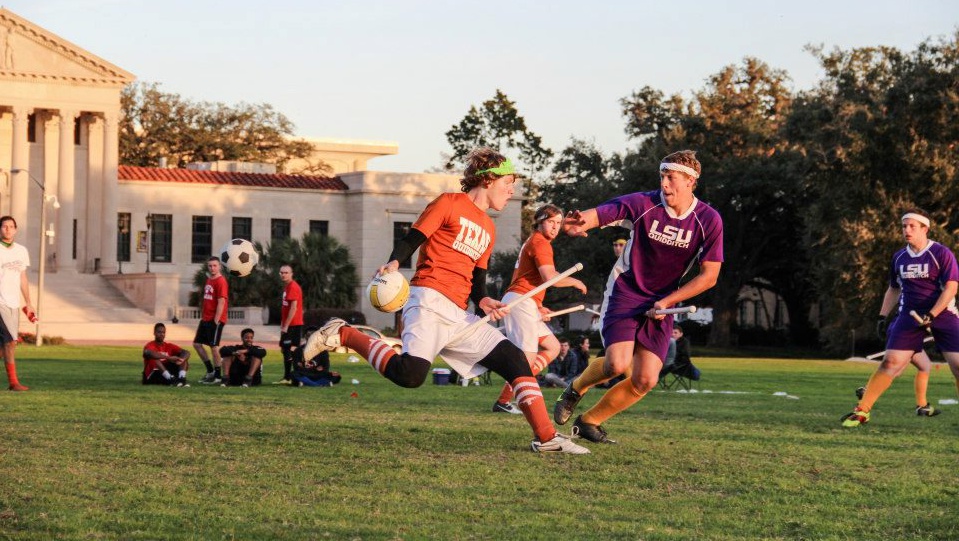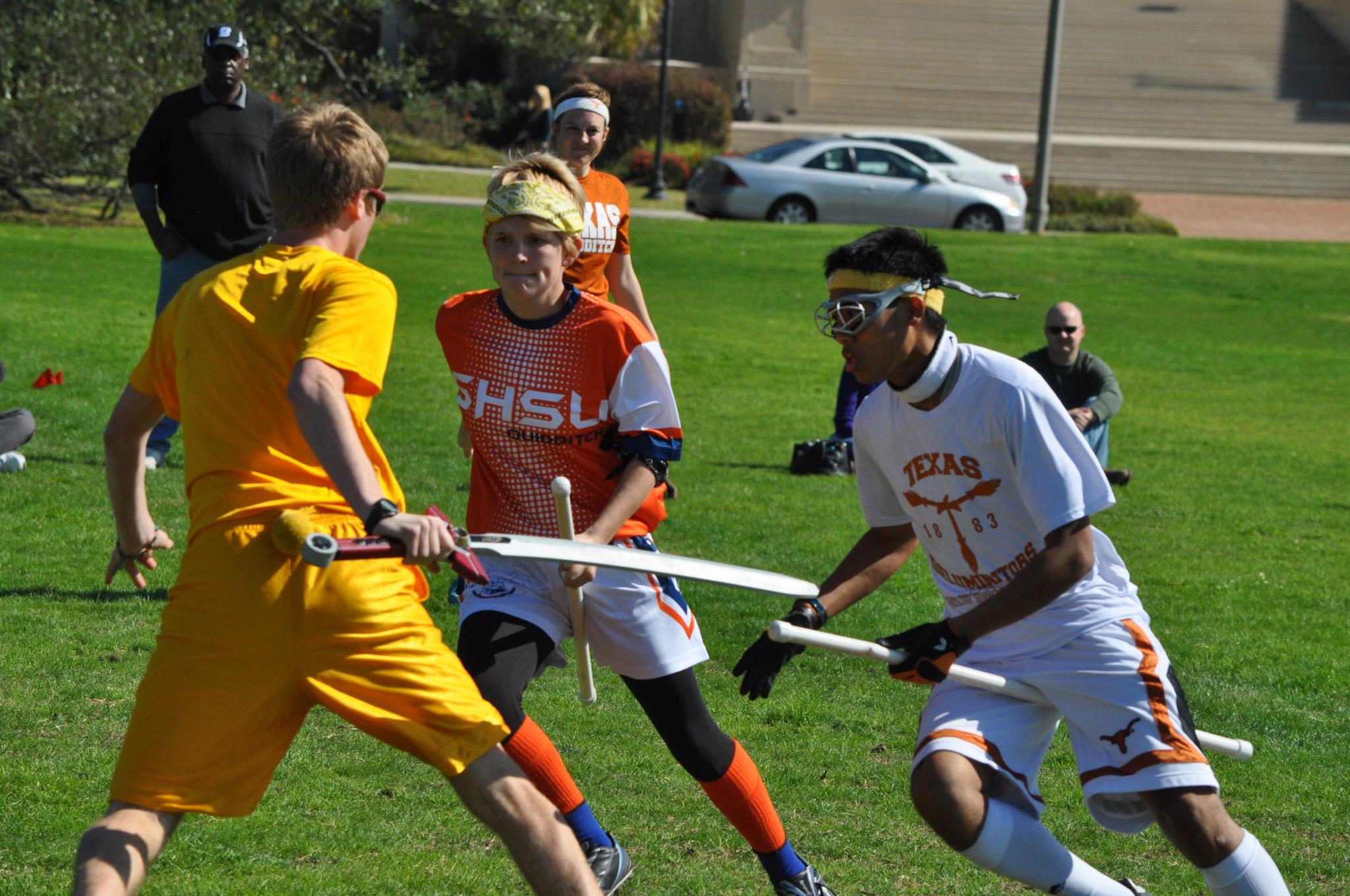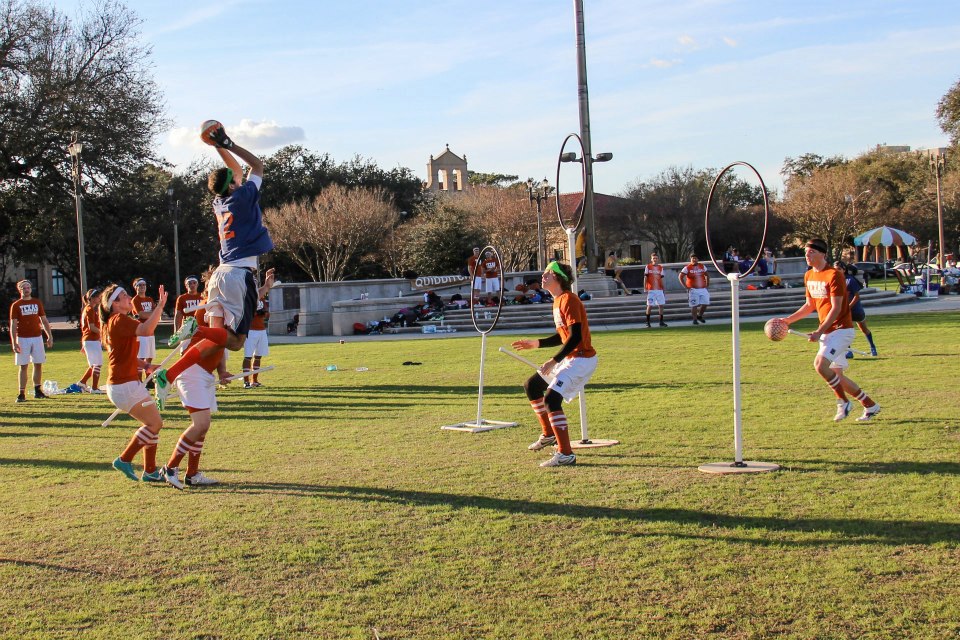- Rule, Britannia, no more?
- Unpopular Opinions: US Quadball Cup 2023
- Proven Contenders: University of Virginia
- Proven Contenders: Rutgers University
- Proven Contenders: University of Michigan
- Proven Contenders: Creighton University
- Different Perspectives: A Look Inside USA Ultimate
- Antwerp QC, Much of Belgian Core, Leaves Competitive Quidditch
Mardi Gras Recap
- Updated: February 15, 2013

With sunny skies and a field of talented squads, this year’s Mardi Gras Cup got off the ground much more smoothly than last. But in the end, things couldn’t have been more similiar, with No. 3 University of Texas – Austin beating LSU in the finals for a second straight year. This tournament was the last for many of these teams before their respective regionals, so let’s take a look at what we’ve learned.
University of Central Florida
The lone Florida team that made it to Baton Rouge, UCF was recently chosen by the IQA to serve as the local Div. II representative at the World Cup. Although they got off to a rough start, catching the snitch to earn their only points against Texas in a 140 – 30* defeat, UCF moved on to send University of Texas – San Antonio to overtime with a catch. They then caught it again to eke out a 110 – 120*^ win. After defeating UNO and earning the No. 5 seed, they came up against UTSA for a rematch. This time, however, UTSA wasn’t going down so easily, eliminating UCF, 120* – 30.
University of New Orleans
There may be no team in the IQA carried on the back of one player as much as UNO is by the tireless Brittany Geeck. While they have never really had much of a chaser game, their beater play, led by Geeck, is surprisingly strong and constantly improves. UNO didn’t win any games at Mardi Gras, and fell to seventh seed USM in bracket play. But If their chasers could ever reach the next level, this could easily become a competitive team.
University of South Alabama
Like UNO, South Alabama’s struggle with numbers has made tournament performance difficult for them. The players they did bring continue to rely heavily on inaccurate longshots and tire easily. Although they lost to LSU and USM, they did manage to beat a weakened Loyola twice by snitch catches (30 – 40* and 110* – 80). But lacking players and facing a tall task, they forfeited their quarterfinal game against Texas.
Loyola
Still down their top chaser and beater, both of whom were out with injuries sustained the previous weekend at Bottom of the Bracket, Loyola seemed resigned to their fate throughout the tournament. Despite some excellent efforts by chasers Steven Gergen and Jake Gomrick, they failed to perform as a team and lost to South Alabama in the first round of bracket play.
University of Southern Mississippi
Returning to the tournament where they debuted a year ago, USM lost to Loyola and UTSA on suicide snatches, with their only pool win coming against South Alabama. But they beat UNO to advance in the bracket, coming up short against Austin Quidditch, 100* – 10. Although their chaser play is strong overall, USM would most benefit from improving the focus of their beaters. There communication, especially with the snitch on field, is lacking, and cost them at times during the day.
Sam Houston State University
Coming off their first ever tournament win the previous weekend, and showing off some snazzy new uniforms (with pockets!), the Bearkats played one of the tougher schedules in the tournament. Facing off against Texas and Austin in the pool rounds, their only break came when they played UNO. Thanks to LSU’s pool loss to Austin dropping them to the three seed, 6 seed SHSU faced off against them in the quarterfinals. Despite strong chaser play, their beaters weren’t able to match up to LSU, and they eventually lost, 110* – 20.

Snitch Will Orscheln defends himself against seekers Jordan Fowler (SHSU) and Kevin Gandingco (Austin) (Photo: Paxton Casey)
Austin Quidditch
At the beginning of the spring, Austin Quidditch, effectively Texas’s JV team, lost its best two players, beaters Lori Lopez and Evan Carr, to the official school side. But Austin remains a solid team, and has worked around the losses without missing a beat. There is no doubt this team works in imitation of its big brother team: it never stops moving on offense, defense, or transition. But it definitely has its own unique style, stemming from the differing strengths and weakness of its players. The Austin beaters very much like to hold on to their bludgers once they have them, playing more conservatively much of the time. The chasers are divided into two groups – the light fast ones often making fast breaks, and the more solid ones stopping opposing offenses in their tracks.
After defeating LSU in a very intense pool play match, 90*-50, Austin also beat Sam Houston and UNO to go 3-0 and claim the No. 2 seed. Beating USM sent them on to the semis where they faced LSU yet again. The game once again came down to a snitch grab, but it was LSU’s pull the second time around that eliminated Austin.
University of Texas – San Antonio
This is a program that only began competing four months ago, but is already becoming an established presence in the late rounds of Southwest tournaments. The previous weekend, they took second place in the Bottom of the Bracket tournament. At Mardi Gras, they gave Texas a run for their money in the semifinals. Despite their later success, they faced a tough time in bracket play, beating USM but losing to UCF in overtime and LSU. After lunch they pulled together for the UCF rematch and held a well-rested Texas within snitch range. This is a team full of tall, fast athletes who know how to pass. As with many new teams, their overall beater strategy could carry them farther, but with a little improvement they could make waves at regionals or even the World Cup.

Craig Garrison (UTSA) sets up for an alley – oop as Stephen Bell and Evan Carr defend (Photo: Lauren Carter)
Louisiana State University
This season has not been kind to the bayou bengals. Thanks to a spate of injuries, Mardi Gras was the first tournament they were able to field a full team. As if that was not allowed to happen, the injuries again started to pile up throughout the day. LSU began the day by defeating South Alabama before running into trouble against Austin. Putting that game behind them, they faced off against UTSA in a frustrating game on both sides, full of stoppages. However, once the game finally had some space to get going, LSU built a lead and caught the snitch to win that, 100* 50.
Determined to continue turning the day around, LSU came out fast and furious in their first bracket game against Sam Houston. After winning that, they were able to move on and avenge their earlier loss to Austin. However, just before catching the snitch to win, things started going horribly wrong. Jason Winn snapped his collarbone while seeking, forcing him to the hospital, where he was joined by Melissa White. By the time of the final against Texas, several players were too injured to play. Although LSU ended the day in second place, it feels as though they fell much farther, losing to Texas by 110 points. If they are to return to their former glory, they need to figure out a way to handle the loss of key players like Jason Winn and stop relying on the idea of the “full team,” which they seem destined never to have.
University of Texas
There was nothing stopping Texas at this tournament, and they knew it. Texas finally came into a tournament with a full roster of healthy players. They filled the previous holes at beating with the return of a recovered Lauren Carter as well as Lori Lopez and Evan Carr moving up to join Colin Capello and Hope Machala. Also returning to the team this spring was chaser Sarah Holub. This solid roster allowed Texas to constantly sprint up and down the field and make beating UCF, Sam Houston, and Loyola look easy, earning the top seed. Thanks to South Alabama’s forfeit, Texas did not have to play any bracket games until their semi against UTSA, which they won within a few minutes of the seeker floor ending with an off-pitch catch. When they faced off against and defeated LSU in the finals, they still looked as fresh, and easily plowed through their long time rivals.
Semifinals & Finals
The two semifinals could not have been more different. On one half of the Parade Grounds, UT faced UTSA in a quick, close battle. UTSA was coming off a 120* – 30 win over UCF and Texas had not yet played a bracket game, following a forfeit by South Alabama. Texas had only a 20 point lead about seven minutes in when the game was stopped and players were told the snitch, who had been fighting both seekers on the field of the other semifinal, had been caught. After a moment of tension, Texas seeker Jake Alford appeared holding the snitch and a win for Texas.
The LSU v Austin semi final was a rematch from earlier in the day when Austin beat LSU, 90* – 50. Determined to prove that result and anomaly, LSU played at the intensity level of a World Cup final game. It remained a close defensive battle, even after the snitch returned to the pitch. Suddenly, at 30-30, Winn was forced off with injury, making way for teammate Jake Smith, who had no seeking experience. But, within seconds of play restarting, Smith made the catch, winning the game, 60*-30.
The stage was set for a classic Southwestern final, LSU against Texas. The field was only several yards away from where Texas had won the same game the previous year, ending LSU’s early dominance of the Southwest. The teams even unconsciously lined up on the same sides.

Stephen Bell (Texas) is defended by Jake Smith (LSU) shortly before being sniped by a bludger (Photo Lauren Carter)
LSU held Texas scoreless for the first five minutes of the game, but the team’s players, tired and beaten from a tougher day of games than what Texas had faced, slowly let the Longhorns open up a sizable lead. When the snitch returned, LSU was determined to go down fighting. The beaters, especially Kody LaBauve, did not give any of Texas’s seekers even a sliver of a chance at catching the snitch. Although this extended the game and extended Texas’s lead, the point that LSU needed to catch the snitch became paramount. Finally, LSU scored one quaffle goal and seeker Duncan Ferguson caught snitch Mason Kuzmich, ending the game.
The looming questions from this tournament are how the teams there will adjust for regionals. The Southwest teams decide a champion February 23-24, and USM will compete for one of six South bids in March. The absence of Texas A&M and the Silver Phoenix also leaves many to wonder how they will perform against these teams in a couple of weeks. Although TAMU is currently on top of the region, and the world, they have yet to play a single game this semester, and could have difficulty with a Texas team that seems to have everything clicking.
